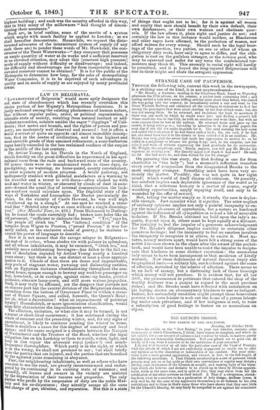LAWIN BELGRAVIA.
" LAWLESSNESS of Belgravia" would more aptly designate the sad state of abandonment which has recently overtaken this choice portion of her Majesty's Metropolitan dominions. It is justly reckoned among the existing phienomena of human nature, that without regular police, order, or political organization, a tolerable state of society, resulting from natural instinct or self- evident necessities, subsists amidst the eager "diggings" of Cali- fornia; that metes and bounds, and the rights of person and pro- perty, are moderately well observed and secured : but it offers a social csntrast of quite an opposite and almost incredible descrip- tion, that in the centre of civilization, and in the highest and most enviable grade of that assumed refinement, a semi-barbarism rages hardly exceeded in the less reclaimed confines of the empire in the middle of the last century.
Dr. Arthur Young, in his Travels in the North of England, dwells forcibly on the great difficulties he experienced in his agri- cultural tours from the rude and backward state of the country. Of course there were no macadamized roads in those days, no gas-lighting, no watering, no horse-patrol, county constabulary, or other adjuncts of modern progress. A bridle pathway, not unfrequently studded with gibbeted malefactors as a warning to the traveller and a terror to evil-doers—often choked up with mud and water in winter, or obscured by clouds of dust in sum- mer—formed the usual line of internal communication the luck- less wayfarer could calculate upon. The frightful state of the ways of Yorkshire and Lancashire the Doctor particularly, de- plores. In the vicinity of Castle Howard, he was well nigh swallowed up in a slough." At one spot he reached a cross- road that "fronted nine ways at once without a single directing- post." (Six Months' Tour, iv. 423.) From Richmond to Darling- ton he bound the roads execrably bad ; broken into holes like an old pavement, "sufficient to dislocate the bones." "Yet," says he, "the people all drink tea." The "infernal condition" of the turnpike from Wigan to Preston, ("proud Preston" it was for- merly called, as the exclusive abode of gentry,) he declares to exceed his power of language to describe. Now it is not meant that the savage relapse in Belgravia— the seat of la creme, whose abodes vie with palaces in splendour, and all whose inhabitants, it may be surmised, "drink tea," and probably more exhilarating beverages—has fallen to the full ex- tent of desolation depicted by Arthur Young nearly a hundred years since ; but there is in one district at feast a close approxi- mation to it. Clouds of dust there are dense and impenetrable, deep pools of stagnant water, yawning and dislocating cavities, with an Egyptian darkness overshadowing throughout the noc- turnal hours, opaque enough to bewray any reckless passenger on foot, horseback, or in carriage, against raisea-up banks, pointed palisades, sinecure lamp-posts, and still more serious jeopardies. Such, it may truly be affirmed, are the dangers that pervade not an obscure part but the central division of the Belgravian domain, extending from the bottom of Grosvenor Place to within a stone- cast of Sloane Square and called, forsooth, the Queen's Road ; but oh, what a desecration! what an impeachment of patrician loyalty Houndsditch, or more ignominious classification, would more fitly characterize the imposthumous avenue. The affliction, visitation, or what else it may be termed, is not a recent or short.lived occurrence; it has continued during the whole of summer and the preceding winter, and, for any signs of amendment, is likely to continue pending the winter to come. There is doubtless a cause for this neglect of sanatory and local duties ; and the cause assigned is a dispute between the Marquis of Westminster and the Trustees of the Road, whether the legal obligation lies on his Lordship or them to watch, water, light, and keep in due repair the aforesaid royal (pshaw !) and much- frequented thoroughfare. Which party is in the right, or which is in the wrong, we shall not presume to say ; but shall briefly state the parties that are injured, and the parties that are benefited by the agitated point remaining in abeyance. First, the neighbouring inhabitants, as well as others who have occasion to use the road, are greatly inconvenienced and endan- gered by its continuing in its existing state of nuisance ; and secondly, all lessees and owners in the vicinity are mulcted by the depreciation of their tenures and properties. The only Parties who profit by the suspension of duty are the noble Mar- quis and his co-disputants ; they adroitly escape all the onus and charge of gas, ablution, and reparation. But this is a state of things that ought not to be; for it is against all reason and equity that men should benefit by their own default, their own misfeasance, or their own wanton and obstinate quar- rels. If the law allows it, plain right and justice do not; and certainly the law in this instance would neither, as Blackstone and other sages have affirmed, be the perfection of reason, nor afford redress for every wrong. Should such be the legal bear- ings of the question, two parties, on one or other of whom an obligatory duty rests, have only to agree to differ, and the obli- gation is cast on the guileless stranger, or the tertium quid, who may be squeezed and suffer for any term the confederated tor- menters may think fit. This anomaly in social right will hardly be permitted, and it is hoped the long-injured Belgravians will rise in their might and abate the arrogant oppression.
























 Previous page
Previous page